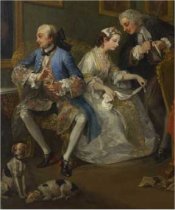First Performance: 7 February 1792 at Burgtheater, Vienna.
Principal Characters:
| Carolina, Geronimo's daughter |
Soprano |
| Elisetta, her sister |
Mezzo-Soprano |
| Paolino, young clerk to Geronimo |
Tenor |
| Geronimo, a rich merchant |
Bass |
| Fidalma, his sister |
Contralto |
| Count Robinson |
Bass |
Time and Place: 18th Century Bologna at Geronimo's home
Synopsis:
We are in the household of Geronimo, a wealthy citizen of Bologna; he has two daughters,
Elisetta and Carolina, and a sister Fidalma, who runs the household. He also has a young
secretary, Paolino, who is secretly married to the younger daughter, Carolina.
Act I
Paolino is working to arrange a marriage contract between Elisetta and his patron, Count
Robinson, hoping that as soon as Geronimo's older daughter is well married, his marriage
to the younger one will be acceptable. Count Robinson has written a letter expressing
interest - tempted by Elisetta's substantial dowry - and Geronimo is thrilled to think
that his daughter will be a Countess. Fidalma confesses to her niece that she is in
love, too, but only reveals in an aside to the audience that she has her eye on Paolino.
When the Count arrives he is disappointed to find that it is not Carolina who has been
offered to him. He tells Paolino that he will be content with a smaller dowry and sends
him off to arrange the match. Carolina doesn't dare tell the count that she is married,
so when she admits she has no lover it excites him further; she tries to convince him
she has no desire or qualification to be a countess, but he continues to pursue her.
Elisetta accuses them both of betraying her, and the commotion attracts Fidalma who
joins Carolina in trying to calm Elisetta; everyone tries at once to explain his or her
feelings to the confused and exasperated Geronimo.
Act II
Geronimo insists that the Count must honor his contract and marry Elisetta, but the Count
refuses. When he offers to accept a smaller dowry with Carolina's hand instead, Geronimo
is delighted to save face and money - as long as Elisetta agrees.
Paolino is distraught, and throws himself on Fidalma's mercy, but is stunned to find that
she hopes to marry him; he faints, giving her the idea that she returns his emotion and
making Carolina think she has been betrayed, but he promises that they will leave the
house at dawn and take refuge in the house of a relative.
The Count tells Elisetta all his bad habits and physical defects, hoping she'll reject
him, but she stands firm - and he finally confesses that he cannot abide her. Geronimo
can't persuade her either. Fidalma suggests sending Carolina to a convent, and Geronimo
agrees. Carolina is broken-hearted and tries to confess her predicament to the Count,
but they are interrupted by her sister, her aunt and her father who are gleeful at
having caught them together, and Geronimo sends Paolino off with a letter to the Mother
Superior.
After a brilliant and farcical finale Paolino and Carolina finally confess they have
been married for two months; Geronimo and Fidalma are furious, but the Count and
Elisetta advise them to forgive the newlyweds, adding that they themselves will marry
after all.
[Synopsis Source: Opera Theatre of St. Louis]
Click
here for the complete libretto.
Click here for large image of Hogarth's Marriage A-la-Mode: 1. The Marriage Settlement (National Gallery)
